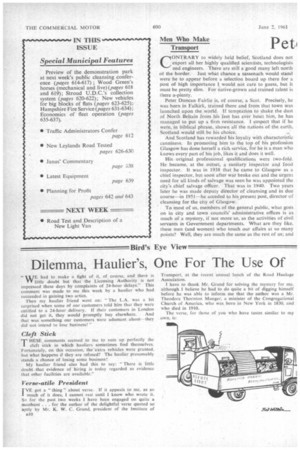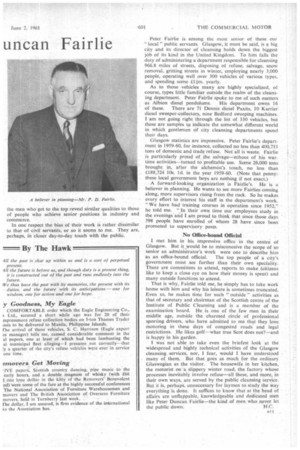Men Who Make Transport
Page 44

Page 45

If you've noticed an error in this article please click here to report it so we can fix it.
Pet uncan Fairlie
CONTRARY to widely held belief, Scotland does not export all her highly qualified scientists, technologists and engineers. There are still a good many left north of the border. Just what chance a sassenach would stand were he to appear before a selection board up there for a post of high importance I would not care to guess, but it must be pretty slim. For native-grown and trained talent is 1 here a-plenty.
Peter Duncan Fairlie is, of course, a Scot. Precisely, he was born in Falkirk, trained there and from that town was launched upon the world. If temptation to shake the dust of North Britain from his feet has ever beset him, he has managed to put up a firm resistance. I suspect that if he were, in biblical phrase, shown all the nations of the earth, Scotland would still be his choice.
And Scotland has rewarded his loyalty with characteristic canniness. In promoting him to the top of his profession Glasgow has done herself a rich service, for he is a man who knows every part of his job, likes it and does it well.
His original professional qualifications were two-fold. He became, at the outset, a sanitary inspector and food inspector. It was in 1938 that he came to Glasgow as a chief inspector, but soon after war broke out and the urgent need for all kinds of salvage was seen he was appointed the city's chief salvage officer. That was in 1940. Two years later he was made deputy director of cleansing and in due course—in 195I—he acceded to his present post, director of cleansing for the city of Glasgow.
To most of us. members of the general public, what goes on in city and town councils' administrative offices is as much of a mystery, if not more so, as the activities of civil servants in Government departments. What are they like. these men (and women) who touch our affairs at so many points? Well, they are much the same as the rest of us; and the men who get to the top reveal similar qualities to those of people who achieve senior positions in industry and commerce.
In one respect the bias of their work is rather dissimilar to that of civil servants, or so it seems to me. They are, perhaps, in closer day-to-day touch with the public.
Peter Fairlie is among the most senior of these our local" public servants. Glasgow, it must be said, is a big city and its director of cleansing holds down the biggest job of its kind in the United Kingdom. To him falls the duty of administering a department responsible for cleansing 966.8 miles of streets, disposing of refuse, salvage, snow removal, gritting streets in winter, employing nearly 3,000 people, operating well over 300 vehicles of various types. and spending some £lm. yearly.
As to those vehicles many are highly specialized, of course, types little familiar outside the realm of the cleansing department. Peter Fairlie spoke to me of such matters as Albion diesel pendulums. His department owns 16 of these. There are 71 Dennis diesel Paxits, 10Karrier diesel sweeper-collectors, nine Bedford sweeping machines. I am not going right through the list of 330 vehicles, but these are samples to indicate the somewhat different world in which gentlemen of city cleansing departments spend their days.
Glasgow statistics are impressive. Peter Fairlie's department in 1959-60, for instance, collected no less than 400,733 tons of domestic and trade refuse. Not all is waste. Fairlie is particularly proud of the salvage—echoes of his wartime activilies----turned to profitable use. Some 26,000 tons brought in, after the alchemist's touch, no less than £188,724 10s. Id. in the year 1959-60. (Note that penny: these local government boys arc nothing if not exact.) A forward-looking organization, is Fairlie's. He is a believer in planning. He wants to see more Fairlies coming along, more supervisors rising from the ruck. So he makes every effort to interest his staff in the department's work. "We have had training courses in operation since 1952," he told me. "In their own time our employees study in the evenings'and I am proud to think that since those days 398 people have enrolled of whom 28 have since been promoted to supervisory posts.
No Office-bound Official I met him in his impressive office in the centre of Glasgow. But it would be to misconceive the scope of so senior an administrator's work were one to describe him
as an office-bound official. The top people of a city's government must see further than their own speciality. There are Committees to attend, reports to make (citizens like to keep a close eye on how their money is spent) and many outside functions to attend.
That is why, Fairlie told me, he simply has to take work home with him and why his leisure is sometimes truncated. Even so, he makes time for such " outside" activities as that of secretary and chairman of the Scottish centre of the Institute of Public Cleansing and is a member of the examination board. He is one of the few men in their middle age, outside the. charmed circle of professional sporting drivers, who have admitted to me that they love motoring in these days of congested roads and legal restrictions. He likes golf what true Scot does not?—and is happy in his garden.
I was not able to take even the briefest look at the widespread and highly technical activities of the Glasgow cleansing services, nor, I fear, would I have understood many of them. But that goes as much for the ordinary Glaswegian as the visitor. The housewife in her kitchen, the motorist on a slippery winter road, the factory whose processes inevitably involve refuse—all these, and more, in their own ways, are served by the public cleansing service. But it is, perhaps, unneccesary for laymen to study the way everything is done. It suffices to know that at the head of affairs are unflappable, knowledgeable and dedicated men like Peter Duncan Fairlie—the kind of men who never let the public down.
















































































































































































